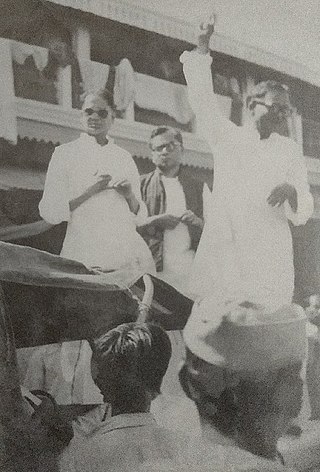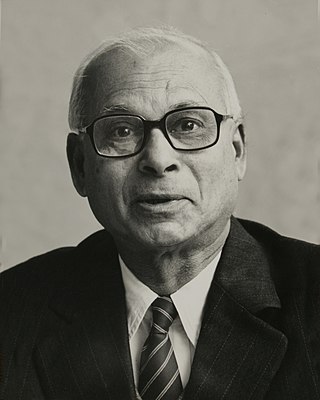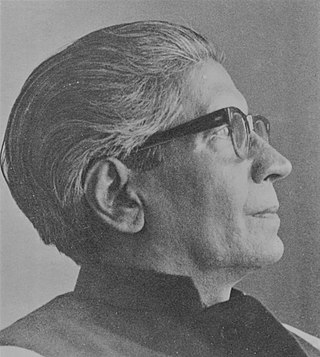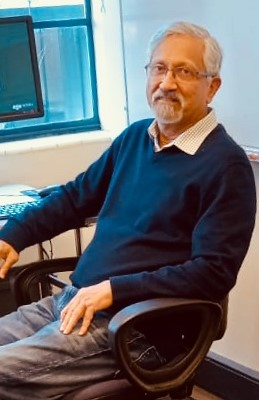
Jayanta Kumar Ray (born 9 December 1934) is an Indian historian and National Research Professor. [1] He was born in East Bengal, British India on 9 December 1934.

Jayanta Kumar Ray (born 9 December 1934) is an Indian historian and National Research Professor. [1] He was born in East Bengal, British India on 9 December 1934.

Mulk Raj Anand was an Indian writer in English, recognised for his depiction of the lives of the poorer class in the traditional Indian society. One of the pioneers of Indo-Anglian fiction, he, together with R. K. Narayan, Ahmad Ali and Raja Rao, was one of the first India-based writers in English to gain an International readership. Anand is admired for his novels and short stories, which have acquired the status of classics of modern Indian English literature; they are noted for their perceptive insight into the lives of the oppressed and for their analysis of impoverishment, exploitation and misfortune. He became known for his protest novel Untouchable (1935), which was followed by other works on the Indian poor such as Coolie (1936) and Two Leaves and a Bud (1937). He is also noted for being among the first writers to incorporate Punjabi and Hindustani idioms into English, and was a recipient of the civilian honour of the Padma Bhushan, the third-highest civilian award in the Republic of India.

The Congress Socialist Party (CSP) was a socialist caucus within the Indian National Congress. It was founded in 1934 by Congress members who rejected what they saw as the anti-rational mysticism of Gandhi as well as the sectarian attitude of the Communist Party of India towards the Congress. Influenced by Fabianism as well as Marxism-Leninism, the CSP included advocates of armed struggle or sabotage (such as Yusuf Meherally, Jai Prakash Narayan, and Basawon Singh as well as those who insisted upon Ahimsa or Nonviolent resistance. The CSP advocated decentralized socialism in which co-operatives, trade unions, independent farmers, and local authorities would hold a substantial share of the economic power.
Clinton B. Seely is an American academic and translator, and a scholar of Bengali language and literature. He has translated the works of Ramprasad Sen and Michael Madhusudan Dutt and written a biography of Bengali poet Jibanananda Das. He has also authored software packages related to Bengali. His latest book, Barisal and Beyond, was published in India in 2008.

Ram Sharan Sharma was an Indian historian and Indologist who specialised in the history of Ancient and early Medieval India. He taught at Patna University and Delhi University (1973–85) and was visiting faculty at University of Toronto (1965–1966). He also was a senior fellow at the School of Oriental and African Studies, University of London. He was a University Grants Commission National Fellow (1958–81) and the president of Indian History Congress in 1975. It was during his tenure as the dean of Delhi University's History Department that major expansion of the department took place in the 1970s. The creation of most of the positions in the department were the results of his efforts. He was the founding Chairman of the Indian Council of Historical Research (ICHR) and a historian of international repute.

Suniti Kumar Chatterji was an Indian linguist, educationist and litterateur. He was a recipient of the second-highest Indian civilian honour of Padma Vibhushan.

Mihir Rakshit is an Indian economist, known for his work on fiscal, monetary and other policy, especially issues that concern developing economies. Originally from Chittagong, which is now in Bangladesh, he did his graduation from Presidency College, Calcutta, post-graduation from the University of Calcutta and his PhD from London School of Economics. He taught at the departments of Economics of The University of Calcutta, The University of Burdwan, Presidency College Calcutta, and Indian Statistical Institute Calcutta, as faculty. He also taught at Delhi School of Economics and Erasmus University Rotterdam, as visiting faculty. He served the Reserve Bank of India for two terms as a member of its Central Board of Directors. He was director of the open access quarterly journal Money and Finance published by ICRA Limited from 1997 to July 2016.
Jatin Das is an Indian painter, sculptor and muralist. He is counted amongst the leading contemporary artists of India.
Rabindra Kumar Das Gupta was an Indian scholar of Bengali and English literature and a social and cultural commentator. He was considered by his peers as one of the last scholars with equal command of English and Bengali languages.
Shiv K. Kumar was an Indian English-language poet, playwright, novelist, and short story writer. His grandfather late Tulsi Das Kumar was a school teacher and his father Bishan Das Kumar, was a retired headmaster. The letter 'K' stands for Krishna, i.e. Shiv Krishna Kumar.
Krishna Kumar is an Indian intellectual and academician, noted for his writings on the sociology and history of education. His academic oeuvre has drawn on multiple sources, including the school curriculum as a means of social inquiry. His work is also notable for its critical engagement with modernity in a colonized society. His writings explore the patterns of conflict and interaction between forces of the vernacular and the state. As a teacher and bilingual writer, he has developed an aesthetic of pedagogy and knowledge that aspires to mitigate aggression and violence. In addition to his academic work, he writes essays and short stories in Hindi, and has also written for children. He has taught at the Central Institute of Education, University of Delhi, from 1981 to 2016. He was also the Dean and Head of the institution. From 2004 to 2010, he was Director of the National Council of Educational Research and Training (NCERT), an apex organization for curricular reforms in India. He was awarded the Padma Shri by the President of India in 2011.

Martha Alter Chen is an American academic, scholar and social worker, who is presently a lecturer in public policy at the Harvard Kennedy School and senior advisor of the global research-policy-action network WIEGO and a member of the Advisory Board of the United Nations University World Institute for Development Economics Research (UNU-WIDER). Martha is a development practitioner and scholar who has worked with the working poor in India, South Asia, and around the world. Her areas of specialization are employment, poverty alleviation, informal economy, and gender. She lived in Bangladesh working with BRAC, one of the world's largest non-governmental organizations, and in India, as field representative of Oxfam America for India and Bangladesh for 15 years.

Mannaraswamighala Sreeranga Rajan was an Indian academic who is widely acknowledged as the doyen of International Relations and Area Studies in India. Professor Rajan set up the Indian School of International Studies along with Pandit Hriday Nath Kunzru and Professor A. Appadorai in 1955.

Kedareswar Banerjee was an X-ray crystallographer and director of the Indian Association for the Cultivation of Science, Kolkata. Early in his career he determined the structures of naphthalene and anthracene. In 1931, he worked with Sir William Henry Bragg and developed one of the first direct methods of crystal structure determination. He was Professor of Physics at the Indian Association for the Cultivation of Science from 1943 to 1952 and Director of the Association from 1959 until his retirement in 1965. Between 1952 and 1959 he was Head of the Department of Physics at Allahabad University. His interests in crystallography were widespread and, with his death, India has lost a renowned teacher. K. Banerjee joined the research group of Sir C. V. Raman at the Indian Association for the Cultivation of Science (IACS), Calcutta, a premier Indian research institute of India. He worked in various institutions including IACS, the India Meteorological Department, University of Dhaka and Allahabad University and finally retired as the Director of IACS, Calcutta in 1965. Prof. Banerjee explained some points of crystal research to Homi J. Bhabha also.

Harkishan Singh was Professor Emeritus at the Panjab University. He was a well recognized pharmaceutical academic, medicinal chemistry researcher and science historian. He had more than half a century experience in his respective fields to his credit. He worked at the Banaras Hindu University, University of Saugar, and the Panjab University in India, and abroad at the University of Maryland, University of Mississippi and the University of London.
Mihir Chowdhury FNA, FASc was an Indian physical chemist and Professor and Head of Department of Chemistry at Presidency College, Kolkata and at the Department of Physical Chemistry of the Indian Association for the Cultivation of Science (IACS). He is known for his studies on the electronic structure of molecules using optical, magneto-optical and quantum-mechanical methods. He was an elected fellow of the Indian National Science Academy and the Indian Academy of Sciences. The Council of Scientific and Industrial Research, the apex agency of the Government of India for scientific research, awarded him the Shanti Swarup Bhatnagar Prize for Science and Technology, one of the highest Indian science awards, in 1977, for his contributions to chemical sciences. Three of his research students were also Shanti Swarup Bhatnager awardees.
Ramesh Chandra Majumdar (1904-1995) was an Indian physicist who made contributions in several branches of theoretical physics, notably statistical mechanics and ionospheric physics. He played a key role in setting up the Department of Physics and Astrophysics at the University of Delhi, which he headed for around nine years, and also was pro-vice-chancellor of the university. He was elected a Fellow of the Indian National Science Academy and was general secretary of the National Academy of Sciences, India.
Ramkrishna Mukherjee was a scientist at the Indian Statistical Institute, Kolkata, President of the Indian Sociological Society (1973–75) and recipient of the Indian Sociological Society's Lifetime Achievement Award in 2005.

Ranabir Samaddar is an Indian political scientist. He holds the Distinguished Chair in Migration and Forced Migration Studies at the Mahanirban Calcutta Research Group. He was a PRIO Global Fellow from 2014–2017.

Abu Sayeed Ayyub was an Indian philosopher, teacher, literary critic and writer in both Bengali and English. Though born into a traditional, Urdu-speaking, Muslim family in Calcutta (Kolkata), he was so deeply captivated in his early teenage by the poems of the Indian Nobel Laureate Rabindranath Tagore that he taught himself Bengali so as to appreciate Tagore better. Later, when he started to write, it was mostly in his adopted language, Bengali. During the initial part of his writing career, Ayyub wrote on aesthetics, religion and socialism. However, it was his philosophical and scientific analysis of creative literature - in particular the poetry and the drama of Tagore - that finally brought him wide recognition as "one of the most serious and original Tagore scholars". Ayyub is also credited with "co-editing the first anthology of modern Bengali poetry". He taught philosophy at the University of Calcutta, the Visva-Bharati University and the University of Melbourne, and edited the literary and philosophical journal Quest.

Sekhar Bandyopadhyay is an Indian historian and a Fellow of the Royal Society Te Apārangi. Bandyopadhyay is known for his research on the Dalit caste of Bengal.